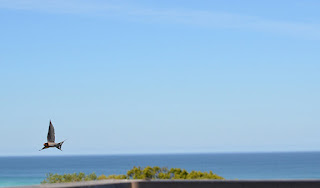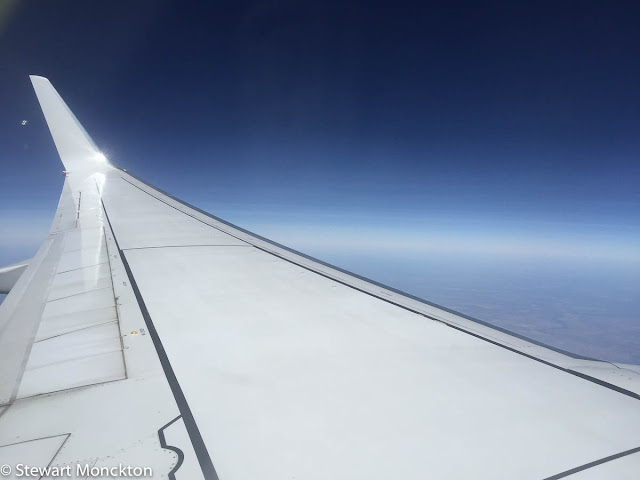On migration
The loss of swallows.
The wind had backed off and swung around to the north. It was not the hard edged summer northerlies that leave you cut and dried, fearing fire, dusty eyed. This was a softer, rounder, wind. But still it grabbed, sticky fingered, at the pages of my book, trying to hurry me along, impatient to get to the end In defiance of the wind’s urgings I stopped reading and looked out into the surf, hoping for dolphins, but none showed.
Switching from a near gaze to a more distant one breaks the book bubble in which I am wrapped, and I noticed the air is filling with birds. Swallows. One, two three. Another group over there - four, five six. More - seven, eight, nine, ten. More - eleven, twelve. More and more counting until counting no longer makes sense and they become simply lots. Their speed and flightful movement, conscious, way beyond Brownian, makes it impossible to do more than estimate numbers; ball park at best. Buried within the sea sky of movement are a few Martins, cousins not brothers or sisters to the majority. Some bushes become favoured resting spots for the birds. Chatter points for calls and communication, meaningful tweets. Some high and open, some low and closed, others dead and broken. There seems no logic in their choices, and if there is, it eludes me at the time.
They swarm around the eaves of the house and land in a controlled stall on any flat surface – horizontal or vertical. No matter how hard I try I can see nothing else in the air around the house but birds. There are no swarms of bugs, no flights of flies to draw the birds here. They just seem to be here because they are here. Their movements project a kind of nervous energy, compounded by their apparent lack of trust in my motives. Any movement on my behalf sends all the perched birds back into the sky. For a second or two the house is hazed by a smoke of birds, until they disperse, chattering their disapproval. The longer I stand the higher they fly. When I sit down the birds slowly drift down as well, and after a few minutes they are back gathering on the eaves. Until I move that is, and then the game starts all over again. It’s a Wednesday afternoon, but by Thursday morning the sky is empty. There is not a swallow to be seen anywhere around the house, in fact I don’t see another one during the holiday. They’ve gone, headed north. Why the birds chose to gather around the house is a mystery. Or maybe it’s the other way around: why did people choose to build a house where the swallows gather?
Why they have chosen to go north is no mystery at all. It’s autumn. An evening chill more than creeps up on you as the sun sets, some of the trees – forced migrants from elsewhere – are losing the sheen of summer green as they gain their showy colours and shed their leaves. In the evenings you can find pockets of air that hold the delightful smell of wood smoke. Not the horror smell of a hot summer’s day, but a gentler, softer smell that speaks of warmth and security, and maybe even the memory of home cooking. The ritual of setting and lighting the fire with the rapid rattle popping of the dry kindles as much a part of the start of autumn as tree colour and gutters full of leaves.
The real mystery of the swallows for me is not the where of their migration, but the when. And not really the when of an individual bird, but the when of them all. These swallows left en masse, together as a group. How does the varied flock come to that single apparently unified decision that today is the day? How is that spread from bird to bird? Is it some form of flock sourced wisdom of the crowd? While we can talk about sensitivity to day length and temperature, the choice of day seems to be a collective rather than a bird by bird decision. Maybe it’s imagination on my part – and it’s not hard to think of a selective pressure that would encourage group migration – but it really does look like a group decision. You can hardly avoid the idea (heretical as it may be) that the birds landing on the bushes and twittering are involved in a collective decision making process. A kind of birdy democracy working out when enough is enough and it’s time to head to the warmer climes and insect rich skies to the north. Are some of the bold held back by the timid, are the less eager pushed on by the brave? All I really know is that the next day the cloud-full skies were empty of swallows. They had succumbed to whatever tip taps on the keyboard of their instincts. I could not but feel the loss of swallows. Nothing looks as empty as a sky that was once full of movement. Nothing holds as deep a silence as a sky that was once full of sound.
I was born in the spring that followed the coldest winter in living memory. Snow sulked under hedge banks until March. The decade was young, it may have even been starting to swing in some places but I was too young to notice. I grew surrounded by the kind of soft greenery that never quite made the leap of grandeur needed to be considered landscape, but it was formative nevertheless. It was countryside in the pure sense of the world, unremarkable yet unique, the sort of place that defines an Englishness that may be unfashionable, but is deeply rooted and old. As was typical for the time and place I spent hours outdoors, wandering, lanes, footpaths and recently uprooted railway lines. For all the freedom that gave I felt the informal restraint of the local Parish boundaries. I had a patch and I stayed on it. The longest journeys were taken on school trips and to Scout camps.
There was a sense of slow decay about the village – and a sense of a far more rapid decay within the frame of our house. The hypnotic drip of a leaky roof and dampening chill of winter pushed the house towards repairs and renovation that were never possible. At the centre of the village, where three roads met and diverged, there was (and still is) a memorial to the dead of two wars. The coal mine and the railway had already gone, the small shops were losing the battle with the supermarkets, and the wood yard – Sheppard’s – seemed to survive more on memory than industry. Now it’s just a street name. In the 70s the lights went out, prices inflated and the value of everybody’s money shrank day by day. The optimism of my birth decade, the one that was supposed to change the world, gave way to a world weary cynicism and by the 80s the village felt old and small. England (or at least the populous south east) embraced the sort of change that had little regard for the small and delicate. You were either in or very far out. I knew to which of these groups I belonged. Whatever the future held, it would probably happen elsewhere. I needed to leave.
As the Thrushes of Scandinavia, Fieldfares and Redwings, were readying themselves to fly south away from the cold, I was getting ready to fly north away from what I knew. It was the longest journey I had ever been on. Twelve hours on public transport deposited me in Sunderland. Although I had no idea at the time, this was a migration of my own. Still restricted by the motion of my own feet, I explored the back lanes and broken beaches of the area. The empty coasts beyond the town remained unknown. Empty shops gap toothed the shopping streets. This was not a green place. It was suffering under the triple hammer blows of a changed world economy, a government that seemed to be focussed elsewhere and political impotence. I may as well have been on the moon. I stayed in the area beyond the demands of study and eventually found places that were green and in some ways familiar, but I was always a visitor. My voice confirmed this, and people took delight in reminding me. For the second I knew, I needed to leave.
This time I headed west. All my belongings were packed into one large box and a couple of smaller bags. I had not yet accumulated the volume of possessions that can hold you to one place beyond the reason of arrival. A couple of hours later I arrived in the Lake District. This was not a migration, more of a relocation, but the difference was profound. I could have moved from Greenland to Saudi Arabia and seen less change. The Lake District is as grand as landscape gets in England. Clouds still wandered lonely over fell tops as they did when they inspired poets. The ghosts of Peter Rabbit, Squirrel Nutkin and Jemima Puddleduck hang over the gentler south. There are National Trust properties and signs everywhere, although most people just use the car parks.
The land was rich with poetry and gardens, with books and shared (but never really experienced) memory. The Lake District is almost the collective imagined vision of the English countryside made real – only with a few added steep hills and a little too much rain. And for over four years I got to live there. On my days off I got to be in the place where people took holidays. I walked, climbed and occasionally paddled kayaks or canoes. I saw sun, rain, mist and snow. This was the kind of place I had always wanted to be – being there closed the circle of movement that had begun years ago in Somerset. I found what I had been looking for.
But I found something else as well – something unexpected, something that began with an unplanned collision of strangers in a work staff room. Something that grew and grew. Something that I would have to go half way around the world to keep.









Comments
along for the trek,
watching the swallows,
reveling in the lake district,
and listening for what you'll say
next.
thanks for the tag-along,
Jennifer
I like reading your stream-of consciousness....
I'm pretty sure that sometimes birds are just playing -- soaring on thermals or just , as you say, "meeting up".....
thanks for sharing!
Regards,